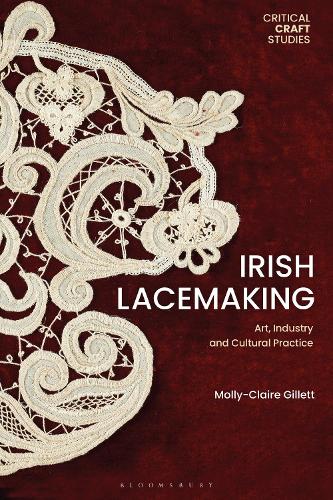
Irish Lacemaking: Art, Industry and Cultural Practice
(Hardback)
Publishing Details
Irish Lacemaking: Art, Industry and Cultural Practice
By (Author) Molly-Claire Gillett
Bloomsbury Publishing PLC
Bloomsbury Visual Arts
18th September 2025
United Kingdom
Classifications
Professional and Scholarly
Non Fiction
History of design
Lace and lacemaking
Physical Properties
Hardback
288
Width 156mm, Height 234mm
Description
Following the career of the Irish lace designer and inspector Emily Anderson (1856-1948), and exploring the contemporary relevance of her work, this book charts a path through the many institutions, organizations, philanthropic initiatives and government bodies that supported, promoted and monitored the crafting and design of lace in Ireland from the late 19th century onwards.
The story of laces introduction in Ireland to provide work and sustenance during the Irish Famine is a well-known element of social history, yet the development of the craft as a set of techniques and designs, with a supporting infrastructure of inspection and education has never been the subject of a comprehensive study. Where did designs for Irish lace come from Who decided how and to whom it would be taught How were the aesthetics and institutions of lace design and lacemaking shaped by contemporary concerns about gender, politics and class This interdisciplinary book gathers little-studied textual and material sources to explore these questions, informed by recent critical work in craft and design studies as well as by pattern books and local, embodied knowledge from practitioner communities.
This narrative highlights the crafts development and cultural meaning as well as its interconnectedness with deeply politicized, gendered and class-based discourses surrounding design, education, taste and industry. Weaving together a network of exchanges between Irish institutions such as the Cork School of Art, Irish Agricultural Organisation Society, and Department of Agriculture and Technical Instruction, and by following Andersons career, author Molly-Claire Gillet traces early feminism in craft and how lace facilitated a path to female professionalization in Irish industry.
The book concludes with a consideration of contemporary Irish lacemaking now proudly claimed as a part of Irelands intangible cultural heritage and charts a shift through the 20th century in the conception of lace design as art for industry, and lacemaking as an economic necessity to both practices as expressions of identity, creativity and networked community-building.
Author Bio
Molly-Claire Gillett, PhD, is Scholar-in-Residence in Interdisciplinary Studies and Practices in Fine Arts in the faculty of Fine Arts at Concordia University, Canada. She lectures in Fine Arts and has published on Irish craft in journals Text and Performance Quarterly, New Hibernia Review and The Collections of Alfred Morrison, and has contributed to The Bloomsbury Encyclopedia of World Textiles (forthcoming, 2025).
